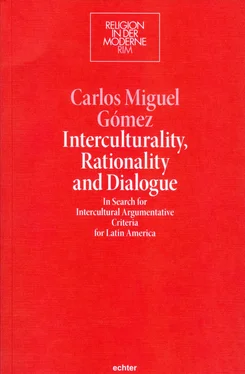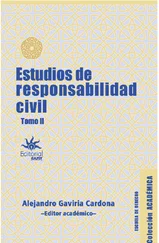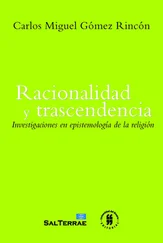Carlos Miguel Gómez
Interculturality, Rationality and Dialogue
Religion in der Moderne
Herausgegeben
von Matthias Lutz-Bachmann,
Thomas M. Schmidt
und Michael Sievernich
RIM Band 23
Carlos Miguel
Gómez
Interculturality,
Rationality
and Dialogue
In Search for
Intercultural Argumentative
Criteria
for Latin America
echter
Bibliografische Information
der Deutschen Nationalbibliothek
Die Deutsche Nationalbibliothek
verzeichnet diese Publikation
in der Deutschen Nationalbibliografie;
detaillierte bibliografische
Daten sind im Internet über
http://dnb.d-nb.deabrufbar.
©2012 Echter Verlag, Würzburg
www.echter-verlag.de
Druckerei:
Difo-Druck, Bamberg
ISBN
978-3-429-03461-0 | Print
978-3-429-04624-8 | PDF
978-3-429-06009-1 | ePub
A los pueblos originarios de Abya Yala, nuestra América.
Como el maíz menospreciados, rechazados como la quinua,
fuente de vida para el mundo.
Acknowledgements Acknowledgements Research is always a collective activity. The commitment and support of many people have made this investigation possible. I want to express my thanks to the Katholischer Akademischer Ausländer-Dienst (KAAD), particularly to Dr. Thomas Krüggeler and Renate Flügel, for their support which has been always much more than financial. The KAAD granted me a PhD Scholarship that allowed me to conduct research in Frankfurt am Main for three years, but most importantly, they have offered me the opportunity to join a vibrant international community of scholars and friends committed to the search for a just future for the so-called developing countries, based on solidarity and self-awareness. The willingness of my Doktorvater, Prof. Dr. Thomas Schmidt, as well as his insights and comments have been decisive for my work. I highly appreciate the freedom he has given me to develop my intuitions and to follow my own path. The generosity of my wife Susana, who agreed to leave her career, friends and family and to move to Germany, and her loving companionship have provided me with the appropriate atmosphere for deep study and reflection. She has been my first partner in dialogue, always ready to discuss my ideas and to encourage me to think harder. In times of confusion and confrontation she has found the way to bring me back to my fundamental ideas, making me remember where I come from and in which behalf I want to speak. Oscar Ardila and Terence Holden proofread the manuscript. For their help I am also very grateful. A.M.D.G.
Note on the Quotation of Sources in Spanish Note on the Quotation of Sources in Spanish The author has translated all quotations from documents in Spanish for which there is no English translation available. To avoid repetition, this is only indicated in the footnotes by “cf.,” before the bibliographical information.
List of Diagrams
Introduction
| PART I: DIVERSITY AND THE CHALLENGES TO DIALOGUE |
| 1. |
The Argumentative Dimension of Intercultural Dialogue |
| 1.1. |
Introduction |
| 1.2. |
The Context for Dialogue |
| 1.2.1. |
Between Inculturation and Dialogue: The Challenges of the Latin American Catholic Church |
| 1.2.1.1. |
The Commitment of the Church with Indigenous Peoples |
| 1.2.1.2. |
The Gospel and the Cultures |
| 1.2.2. |
The Struggles for Recognition of Indigenous Peoples and the Emergence of Multicultural Models |
| 1.2.2.1. |
Indigenous Reconstructed Claims and Regained Rights |
| 1.2.2.2. |
Democratic Participation as Intercultural Deliberation |
| 1.2.2.3. |
Legal Pluralism and The Resolution of Intercultural Conflicts |
| 1.3. |
The Borders of Dialogue |
| 1.3.1. |
The Normative Base of Intercultural Dialogue |
| 1.3.2. |
Grice’s Conversational Maxims Interculturally Examined |
| 1.4. |
Difficulties for Establishing Intercultural Normative Criteria for Dialogue |
| 1.4.1. |
The Objection of Incommensurability as Radical Relativism |
| 1.4.2. |
The Objection of Normativity as Neo-Colonialism |
| 1.4.2.1. |
Interculturality as a Critique to Illegitimate Universalization |
| 1.4.2.2. |
Between Dialectical and Dialogical Dialogue |
| 1.5. |
Conclusion: A first Insight into the Function and Shape of the Intercultural Normative Criteria for Dialogue |
| 2. |
Heterogenic Rationalities |
| 2.1. |
Introduction |
| 2.2. |
Rationalities as Culturally Relative Types of Logic |
| 2.2.1. |
Problems with the Hypothesis of Logical Relativism |
| 2.3. |
Rationalities as Incompatible Worldviews |
| 2.3.1. |
The Case of Andean Rationality |
| 2.3.2. |
Criticisms of the Idea of Different ‘Conceptual Schemes’ |
| 2.4. |
Rationalities as Alternative Reasoning Patterns |
| 2.4.1. |
Rival Explanatory Patterns |
| 2.4.1.1. |
Mythical Causality |
| 2.4.1.2. |
Non Causal Explanatory Principles |
| 2.4.2. |
Competing Patterns of Justification: the Word of Origin as Primary Ground |
| 2.5. |
Conclusion |
| 3. |
Towards an Intercultural Reasonableness |
| 3.1. |
Introduction |
| 3.2. |
From an Intercultural Theory of Rationality to a Notion of Intercultural Reasonableness |
| 3.3. |
Assessing Reasonableness Interculturally: The Pragma-Dialectical Model |
| 3.3.1. |
Does the Pragma-Dialectical Approach offer an Interculturally Valid Model of Reasonableness? |
| 3.3.1.1. |
The Pragma-dialectical Reasonableness is Mono-cultural |
| 3.3.1.2. |
The Pragma-dialectical Reasonableness does not avoid Relativism |
| 3.3.1.3. |
A Critical Discussion does not fit the needs of Intercultural Dialogue |
| 3.4. |
Rethinking Reasonableness Interculturally |
| 3.4.1. |
Rationality and Reasonableness |
| 3.4.2. |
Intercultural Reasonableness as Multi-logical Recognition and Interaction |
| 3.4.3. |
Some Interculturally Unreasonable Moves in Dialogue |
| 3.4.3.1. |
Appeal to radical difference |
| 3.4.3.2. |
Illegitimate Universalization |
| 3.4.3.3. |
Fictitious consensus |
| 3.4.3.4. |
Argumentative violence |
| 3.5. |
Conclusion |
| PART II: BUILDING INTERCULTURAL CHAKANAS |
| 4. |
The Interconnection of Traditions I: An Interpretation of Intercultural Disagreements |
| 4.1. |
Introduction |
| 4.2. |
What is a Claim? |
| 4.2.1. |
Claims as Complex Speech Acts |
| 4.3. |
Types of Claims |
| 4.3.1. |
Types of Conflicting Claims in Latin American Intercultural Dialogues |
| 4.3.2. |
Habermas’ Argumentation Theory Interculturally Revisited |
| 4.4. |
Types of Disagreements |
| 4.5. |
Presuppositions of Disagreement |
| 5. |
The Interconnection of Traditions II: Discursive Interpellation |
| 5.1. |
Introduction |
| 5.2. |
Challenge |
| 5.3. |
Demand |
| 5.4. |
Offering |
| 5.5. |
‘Oppression’ and ‘Shared Problems’ as Factors of Interdependence |
| Conclusion: Pluralistic Argumentation |
| 1. |
The Justification of Argumentative Intercultural Criteria |
| 2. |
The Process of Intercultural Dialogue in Latin America |
| 3. |
The Outcome of Dialogue |
| 4. |
The Limits of the Argumentative Dimension of Intercultural Dialogue |
Appendix: List of Intercultural Argumentative Criteria
Читать дальше












